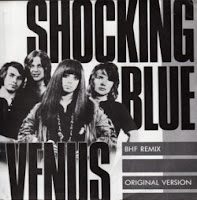Formed in 1967 by guitarist Robbie van Leeuwen, the Dutch quartet Shocking Blue originally had a lineup of VanLeeuwen on guitar, lead vocalist Fred DeWilde, bass player Klaasje Van der Wal, and drummer Cornelius Van der Beek, and the initial configuration of the band had a minor homeland hit with “Lucy Brown Is Back in Town” a year later in 1968.
Things really got moving, though, when DeWilde was replaced by sultry singer Mariska Veres, whose sexy presence and solid singing brought the band a second Netherlands hit, “Send Me a Postcard,” and then a huge international smash with “Venus” in 1969
Although Shocking Blue's albums (1968’s Shocking Blue, 1969’s At Home, 1970’s Scorpio’s Dance, 1971’s 3rd Album, 1972’s Inkpot, 1972’s Attila, 1973’s Dream on Dreamer, and 1974’s Good Times) featured progressive rock elements and inventive arrangements thanks to VanLeeuwen's writing and production skills, the band was essentially marketed as a pop singles unit, and while they scored several subsequent hits in their homeland, none of the group’s releases approached the massive saturation success of “Venus.”
Veres left Shocking Blue in 1974 to pursue a solo career, and while there have been various reunions and different touring incarnations of the band over the years (including a version fronted by Veres in the '90s), its creative history ended then.Veres died of cancer in 2006 at the age of 59.
Nirvana covered the Shocking Blue song "Love Buzz" as their debut single in 1988 and as an extra track on the re-release of their 1989 release Bleach.
Venus Released in late 1969 as a single from the album At Home, and it reached number one on the Billboard Hot 100 on February 7, 1970 selling over one million copies in the U.S., garnering a gold record.
The song's music and lyrics are written by Robbie van Leeuwen, the band's guitarist, sitarist and background vocalist. Van Leeuwen used "The Banjo Song" (an arrangement of folk song "Oh! Susanna") on a 1963 album by The Big 3, as main inspiration.
The female vocal trio Bananarama recorded this in 1986. It was one of the first songs they started performing when they formed the band. In the US, both this and the Bananarama cover version reached #1, making it one of the few songs to do so.
"The above text is a mushup from AllMusic.com & Wikipedia."

No comments:
Post a Comment